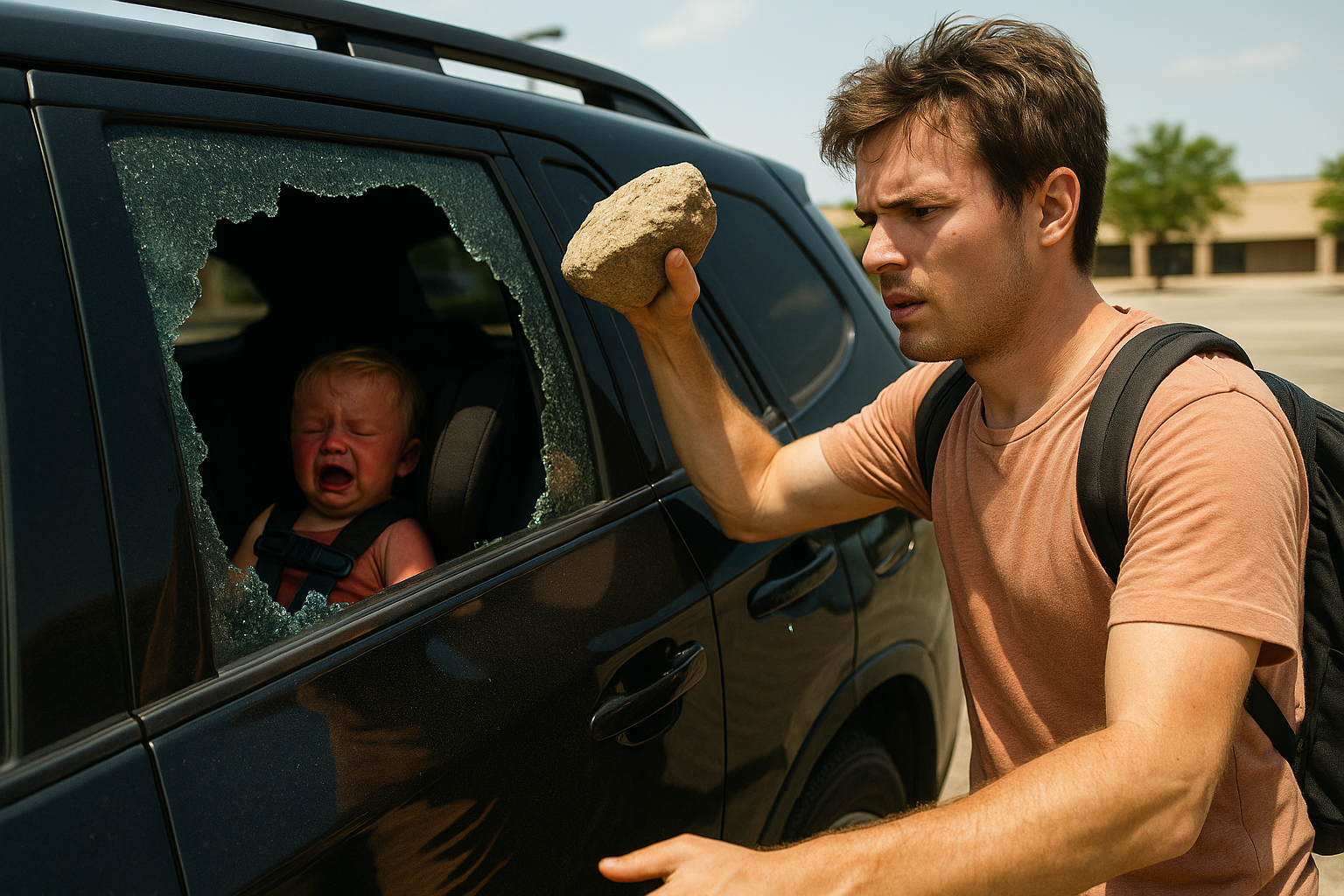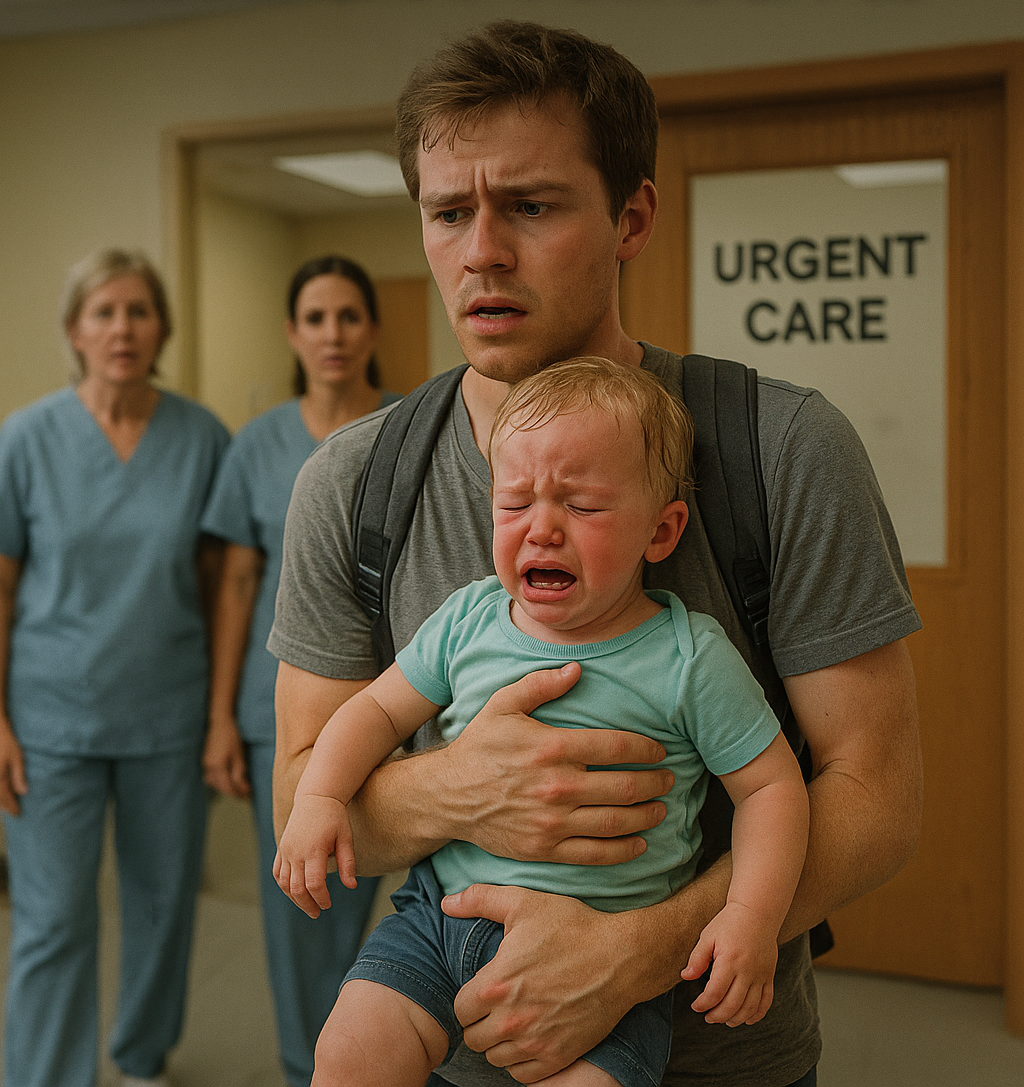It was one of those suffocating summer afternoons when the air felt like a wool blanket draped over the world. The kind of day where everything moved slower, where even the breeze seemed to have given up. People stayed inside to avoid the relentless sun. The sidewalks shimmered, the asphalt bubbled slightly in the heat, and the parking lot outside Maplewood Shopping Plaza was eerily still.
Twenty-three-year-old Lucas Reynolds had just clocked out of his shift at the small electronics repair shop on the edge of town. He worked full-time and took night classes, hoping to eventually earn his degree in computer engineering. For now, life was simple—home, work, school, repeat.

He adjusted the backpack slung over his shoulder and walked across the vast, sun-drenched lot. Most stores in the plaza had closed for renovations, so there were only a few scattered cars baking under the harsh sun. That’s when he heard it.
At first, he wasn’t sure what it was—just a soft, almost inaudible moan. A whimper. He stopped in his tracks, his eyes scanning the lot.
Then he heard it again.
Following the sound, Lucas approached a black SUV parked near the far corner of the lot. The windows were heavily tinted, but the closer he got, the more clearly he could make out a small figure in the backseat.
A child.
Lucas’s heart skipped. He squinted through the glass. The toddler inside—no more than a year old—was strapped in a car seat, his face bright red, lips dry, hair damp with sweat. His small chest heaved in shallow breaths. The boy was too weak to cry anymore.
“Hey! Hey, can you hear me?” Lucas shouted, tapping the glass. No response. He yanked the door handles—locked.
He looked around the lot—completely empty.
No one was nearby. No sign of a parent. Just the sun and a child, slowly baking in a metal trap.
Lucas’s thoughts raced. He pulled out his phone to call 911, but then glanced again at the boy—his eyes fluttering, rolling back.
No time.

Without a second thought, Lucas grabbed a large landscaping rock from a nearby flowerbed, shouted, “I’m sorry, little guy,” and smashed the rear passenger window. The glass shattered with a loud crack. He reached in, carefully avoiding the shards, and unbuckled the baby from his seat. The child’s skin was hot to the touch—alarming.
Lucas cradled him tightly and ran, fast as he could, toward the urgent care center just down the street. The baby whimpered faintly against his chest.
“Help!” Lucas shouted as he burst through the clinic doors, panting. “There’s a baby—he was trapped in a car—he’s overheated!”
Nurses sprang into action. They took the child from Lucas’s arms and rushed him to the back. Lucas collapsed into a chair in the waiting room, his shirt soaked in sweat, his hands trembling. He didn’t even realize he was crying until a receptionist offered him a tissue.
“He’s going to be okay,” she said softly. “You did the right thing.”

Fifteen minutes passed in tense silence before a nurse returned to give an update. The child had been severely dehydrated and was on the verge of heat stroke, but they had stabilized him. A few more minutes and the outcome could have been much worse.
Lucas breathed a shaky sigh of relief.
But just when it seemed the worst was over, a whirlwind of anger stormed through the doors.
A woman in her early thirties burst in, her face flushed—more with rage than worry. “Where is he? Where’s my son?” she demanded.
A nurse led her back, but moments later, she returned—this time beelining straight for Lucas.
“You!” she shrieked. “You broke my window!”
Lucas blinked. “Ma’am, your baby—he was—he could’ve—”
“I was gone for five minutes!” she cut him off. “You had no right! You’re paying for that window! And I’m calling the police!”
The waiting room fell silent.
Lucas was too stunned to respond. He had expected gratitude. Relief. Maybe even a thank you. But instead, she saw only the broken glass, not the boy nearly lost to the heat.
“Ma’am,” a nurse interjected, “your son was in serious condition. That young man likely saved his life.”
But the woman, whose name was later confirmed to be Karen Ellis, was already dialing her phone.

Lucas sat frozen as she reported a “young man vandalizing her vehicle and touching her child.” Within minutes, two officers arrived.
One of them, Officer Grant, walked over to Lucas and calmly asked him to explain.
Lucas recounted everything—the sounds he heard, the condition of the child, the smashed window, the rush to the clinic. The officer nodded as Lucas spoke.
Next, they spoke with the doctors, who confirmed the child had been dangerously close to heatstroke and that Lucas’s actions likely prevented a medical emergency—or worse.
Then they turned to Karen.
“Ma’am,” Officer Grant said, his voice firm, “leaving a child unattended in a locked car, especially in this kind of heat, is extremely dangerous. You’re lucky someone acted quickly.”
Karen sputtered, “But it was just a few minutes! I ran into the pharmacy—”
“You could be facing child endangerment charges,” Officer Grant interrupted. “We’ll need to file a report. For now, we suggest you focus on your son’s recovery.”
Lucas didn’t say a word. He just stood there, unsure whether he should feel vindicated or more distressed.
The officers took statements, and eventually, Karen was allowed to leave with her son—after a firm warning.
As for Lucas, the police thanked him for his bravery. “You did the right thing,” Officer Grant said. “Some people don’t think twice before walking away. You didn’t.”
But Lucas didn’t want praise or attention. He shook his head and said quietly, “I just couldn’t walk away.”
THE STORY GOES VIRAL
What Lucas didn’t know was that a bystander had snapped a photo of him cradling the baby outside the clinic. The image—a young man in a sweat-soaked T-shirt, holding a limp child close to his chest—was posted online that evening with the caption:
“This man shattered a car window today to save a baby from heatstroke. While the mom yelled about the glass, he stayed calm and waited with the baby. A real hero.”
The photo spread like wildfire.

By morning, local news stations had picked up the story. Headlines praised Lucas Reynolds as the “Quiet Hero of Maplewood.” Social media platforms overflowed with comments thanking him, defending him, admiring his courage.
Lucas’s phone buzzed non-stop, but he ignored most of it. He was overwhelmed. The attention felt strange—uncomfortable, even.
Then came a knock at his apartment door.
A man in a suit stood there, holding a small envelope. “Mr. Reynolds? I represent the Hawkins Foundation for Child Safety. We heard your story. We’d like to present you with our annual Community Hero Award.”
Lucas blinked. “I—I didn’t do it for a reward.”
The man smiled. “That’s exactly why you deserve one.”
A WARM ENDING
In the days that followed, Lucas was invited to speak at a local elementary school about safety, kindness, and courage. Though public speaking wasn’t his thing, he agreed. He kept it simple.
“I saw someone who needed help,” he told a room full of children. “And I helped. That’s it.”
One child raised her hand and asked, “Were you scared?”
Lucas smiled. “Yes. But being scared doesn’t mean you don’t act. Sometimes, it means you have to.”
Karen Ellis was not charged, but she was required to take parenting classes and complete community service. Her son made a full recovery. Eventually, she even sent Lucas a handwritten letter—brief, but sincere.
“I was wrong. Thank you for saving my son.”

Lucas kept it in a drawer, unopened for months. When he finally read it, he nodded once and tucked it away again.
Because to him, what mattered most wasn’t the praise, the headlines, or even the apologies.
It was the simple truth that, on a quiet summer day, in a silent parking lot, he had listened to the cry of a child—and answered it.
And that, he believed, was enough.

